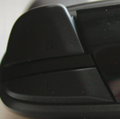L button: Difference between revisions
Green Mario (talk | contribs) (Wii U Game Pad doesn't have any gray buttons.) |
mNo edit summary |
||
| (35 intermediate revisions by 18 users not shown) | |||
| Line 1: | Line 1: | ||
{{ArticleIcons| | {{ArticleIcons|allgames=y}} | ||
[[File:L buttons.png|thumb | {{Disambig2|the L button|other uses|L (disambiguation)}} | ||
The '''L button''' refers to the left shoulder button of the [[Wii U GamePad]], [[Nintendo | [[File:L buttons.png|thumb|The L button on a Nintendo 64 controller, GameCube controller, Classic Controller, Classic Controller Pro, 3DS, and Wii U GamePad, respectively.]] | ||
The '''L button''' refers to the left shoulder button on the [[Nintendo 64 controller]], [[GameCube controller]], and the [[Nintendo 3DS]], as well as one of two left shoulder buttons on the [[Classic Controller]], [[Wii U GamePad]], [[Wii U Pro Controller]], New Nintendo 3DS, left [[Joy-Con]] and [[Nintendo Switch Pro Controller]]. | |||
==Overview== | |||
The functionality of the L button has changed throughout the series. On the N64 controller, it is used for [[taunt]]s. On the GameCube, Classic, Wii U Pro controller and Wii U GamePad, it is used for [[shield]]ing, [[roll]]ing, [[air dodging]], and [[spot dodging]] (which are actions shared with the [[R button]]) while on the 3DS, Switch Pro Controller and dual Joy-Cons, it is used to [[grab]]. Outside of gameplay, the L button is used to navigate some menus like [[tips]] and move lists. | |||
When using a single [[Joy-Con]] in ''[[Ultimate]]'', the L or R button (depending on which Joy-Con is used) is not set to any action by default. Instead, the [[SL button]] is used in its place and is used for grabbing. In this configuration, the L, R, ZL and ZR buttons cannot be set to grab. | |||
In ''[[Super Smash Bros. Brawl]]'', {{for3ds}}, {{forwiiu}}, and ''[[Super Smash Bros. Ultimate]]'', the L button can be customized in the [[controls]] menu to perform other functions. | |||
It should be noted that the 3DS version has the ZR button perform the same functions as the L button due to the game releasing before the New Nintendo 3DS introduced a ZR button to the system. Prior to [[version]] 1.0.5 of the game, these buttons' functions were reversed, so ZL would trigger the same actions as L, though their functions outside of battle (such as in menus) were the same as in current versions. [[Nintendo Switch]] hardware version 10.0.0 introduced the ability to map the functionality of any button to any other button from the console options menu, further diversifying how the L button can be used in ''Ultimate''. | |||
==Gallery== | |||
<gallery> | |||
JoyConLandZL.png|The Joy-Con's L button. | |||
SwitchProLandZL.png|The Switch Pro Controller's L button. | |||
</gallery> | |||
==Trivia== | |||
*Masahiro Sakurai had proposed the L and R buttons on the [[GameCube controller]] be replaced with a scroll wheel, as he believes that would be the ideal method of menu navigation.<ref>[https://www.youtube.com/watch?v=-_3ZnSiwlnc I Want to Choose Fast! <nowiki>[UI]</nowiki>]</ref> | |||
==References== | |||
{{reflist}} | |||
{{Controller}} | {{Controller}} | ||
[[Category:Game | [[Category:Game controls]] | ||
Latest revision as of 15:58, February 2, 2024
The L button refers to the left shoulder button on the Nintendo 64 controller, GameCube controller, and the Nintendo 3DS, as well as one of two left shoulder buttons on the Classic Controller, Wii U GamePad, Wii U Pro Controller, New Nintendo 3DS, left Joy-Con and Nintendo Switch Pro Controller.
Overview[edit]
The functionality of the L button has changed throughout the series. On the N64 controller, it is used for taunts. On the GameCube, Classic, Wii U Pro controller and Wii U GamePad, it is used for shielding, rolling, air dodging, and spot dodging (which are actions shared with the R button) while on the 3DS, Switch Pro Controller and dual Joy-Cons, it is used to grab. Outside of gameplay, the L button is used to navigate some menus like tips and move lists.
When using a single Joy-Con in Ultimate, the L or R button (depending on which Joy-Con is used) is not set to any action by default. Instead, the SL button is used in its place and is used for grabbing. In this configuration, the L, R, ZL and ZR buttons cannot be set to grab.
In Super Smash Bros. Brawl, Super Smash Bros. for Nintendo 3DS, Super Smash Bros. for Wii U, and Super Smash Bros. Ultimate, the L button can be customized in the controls menu to perform other functions. It should be noted that the 3DS version has the ZR button perform the same functions as the L button due to the game releasing before the New Nintendo 3DS introduced a ZR button to the system. Prior to version 1.0.5 of the game, these buttons' functions were reversed, so ZL would trigger the same actions as L, though their functions outside of battle (such as in menus) were the same as in current versions. Nintendo Switch hardware version 10.0.0 introduced the ability to map the functionality of any button to any other button from the console options menu, further diversifying how the L button can be used in Ultimate.
Gallery[edit]
Trivia[edit]
- Masahiro Sakurai had proposed the L and R buttons on the GameCube controller be replaced with a scroll wheel, as he believes that would be the ideal method of menu navigation.[1]
References[edit]
| Controllers and buttons | |
|---|---|
| Nintendo 64 controller | |
| GameCube controller | |
| Wii Remote (and Nunchuk) | |
| Classic Controller | L |
| Nintendo 3DS | |
| Wii U GamePad / Pro Controller | L |
| Joy-Con | |
| Switch Pro Controller | L |
| Third-party controllers | Hori Mini Pad · Arcade controller · Keyboard |
| Other | Smash Controller · Controller modification |

